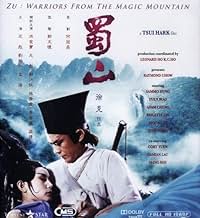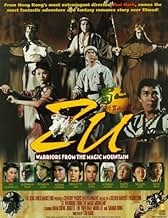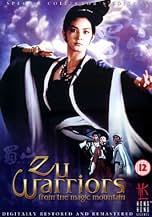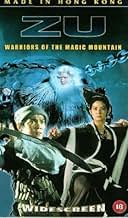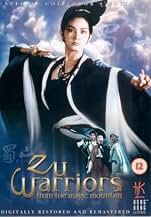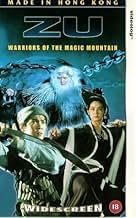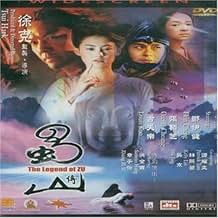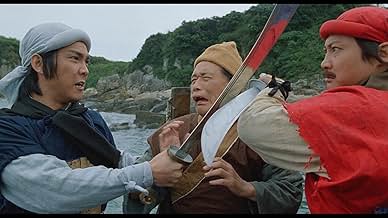Zu, les guerriers de la montagne magique
Original title: Suk saan: San suk saan gim hap
IMDb RATING
6.6/10
3.3K
YOUR RATING
A Chinese soldier in an ancient civil war flees the battlefield and gets caught up in a fantastical quest to save the world from evil.A Chinese soldier in an ancient civil war flees the battlefield and gets caught up in a fantastical quest to save the world from evil.A Chinese soldier in an ancient civil war flees the battlefield and gets caught up in a fantastical quest to save the world from evil.
- Awards
- 5 nominations total
Fung Hak-On
- Evil Disciple
- (as Hark-On Fung)
Kuang-Li Hsia
- Chi Wu-Shuang
- (as Kwan-Li Shen)
- Director
- Writers
- All cast & crew
- Production, box office & more at IMDbPro
Featured reviews
I've got to say, this movie delivered exactly what I thought it would when I bought it. And I bought it simply on the strength of the box and how it said something really good about Tsui Hark. Ever since I have unfailingly watched any Tsui Hark movie that has come across my path. I love this movie. It's goofy in the extreme and at many points simply doesn't make sense. Maybe it's because I've been brainwashed by too many episodes of Mystery Science Theater 3000, but I love cheesy movies. The fight scenes are excellent, the scenery is superb and the story is spellbinding, (there I think I've but exhausted my list of critic cliché adjectives). It's especially good to watch if you're an enhancement smoker.
"Zu Warriors" certainly pushed wuxia to its limits; it has such a relentless air of enthusiasm, especially given its limited budget, that its incredibly easy to dismiss any faults it does have just because of its overwhelmingly extravagant nature. Its glorious, vivid production design and intentionally camp attitude makes it very difficult not to be totally drawn into its colourful images while completely forgetting the film has a plot.
Tsui Hark has included just about everything in this one. The special effects may not be up to much but that is a sideline; the wonderful swordplay starts almost immediately and the films rarely lets up as it jumps from one operatic martial art display to another, helped by an impeccable cast featuring iconic stars such as Sammo Hung and Brigitte Lin.
Unfortuantly it still took some work before films of this sort were appreciated in the west. Despite the efforts of John Carpenter, it still took over a decade and Crouching Tiger to truly bring this wonderful form of entertainment to the masses. There's only so much praise you can give a film before saying it has to be seen to be appreciated fully. This is certainly a landmark in wuxia and an essential showpiece of Hong Kong action at its finest. (A testament to this is the fact the DVD has a Bey Logan commentary.)
Tsui Hark has included just about everything in this one. The special effects may not be up to much but that is a sideline; the wonderful swordplay starts almost immediately and the films rarely lets up as it jumps from one operatic martial art display to another, helped by an impeccable cast featuring iconic stars such as Sammo Hung and Brigitte Lin.
Unfortuantly it still took some work before films of this sort were appreciated in the west. Despite the efforts of John Carpenter, it still took over a decade and Crouching Tiger to truly bring this wonderful form of entertainment to the masses. There's only so much praise you can give a film before saying it has to be seen to be appreciated fully. This is certainly a landmark in wuxia and an essential showpiece of Hong Kong action at its finest. (A testament to this is the fact the DVD has a Bey Logan commentary.)
Set during a feudal period with many warring clans, Yuen Biao stars as a young warrior who deserts his army and , after falling off of a cliff, finds himself in a magical land in the middle of its own war. The forces of Good, lead by the ancient sorcerer White Brows (Sammo Hung), are at odds with the forces of Evil, lead by the Blood Demon (Corey Yuen). Biao teams up with a group of heroic warriors, including Adam Cheng and Brigitte Lin, to help defeat the evil menace.
Filled with bizarre characters (White Brows fights with his extendable eyebrows!) and dazzling, if primitive, special effects, this film is a non-stop feast for the eyes. It maintains a light tone for the most part, and the choreography, which utilizes a lot of "wire-fu", is spectacular. It has a low budget (for American audiences, anyway) can-do feel, and a lot of the effects are done with in-camera trickery that is quite clever.
The script is convoluted, the way a lot of kung-fu epics are, and there are times when you aren't quite sure who is who and what is what. Some of this I blame on the DVD I watched, a poor quality edition from a Chinese distributor, with a shoddy English-dubbed audio track. If someone were to put this out on a re-mastered Blu Ray, I would buy it in a second. Highly recommended for martial arts fans, and fans of weird world cinema.
Filled with bizarre characters (White Brows fights with his extendable eyebrows!) and dazzling, if primitive, special effects, this film is a non-stop feast for the eyes. It maintains a light tone for the most part, and the choreography, which utilizes a lot of "wire-fu", is spectacular. It has a low budget (for American audiences, anyway) can-do feel, and a lot of the effects are done with in-camera trickery that is quite clever.
The script is convoluted, the way a lot of kung-fu epics are, and there are times when you aren't quite sure who is who and what is what. Some of this I blame on the DVD I watched, a poor quality edition from a Chinese distributor, with a shoddy English-dubbed audio track. If someone were to put this out on a re-mastered Blu Ray, I would buy it in a second. Highly recommended for martial arts fans, and fans of weird world cinema.
To truly appreciate Tsui Hark's film Zu: Warriors of the Magic Mountain, one must approach the film from a total aesthetic view. The film is really a site to behold, moves at an unbelievably fast pace, and employs some of the zaniest special effects and action sequences ever captured on film. Zu Warriors is also pure Hark: no other director could have crammed 3000 years of Chinese mythology into an 98-minute mini-epic with as much visceral stimuli, humor, over the top action and nuttiness as Hark did. And, only Tsui Hark could make such a convoluted mess of a narrative so much pure fun to behold.
Zu Warriors is the ultimate Martial Arts fantasy. However, Hark uses this fantasy backdrop for politically charged themes and metaphors. The film starts with two rival soldiers, Ti Ming who fights for the "blue army" and East Zu Soldier who fights for the "orange army", trying to escape (quite comically I might add) the absurdities of war. Ti Ming (Yuen Biao) is court marshaled for agreeing with two of his own generals (one wanted to attack by land, the other by sea. They can't both be right, and since Ti Ming agreed with both, he must be wrong) and East Zu Soldier (Samo Hung) is just on the run from the war. They meet up and are soon ambushed by the "green army", the "yellow army" and the "red army". At this point Biao's character declares "what a colorful war this is!" Right before the attack, Ti Ming and EZS share a moment where they discover they were practically neighbors separated only by a river and the color of their uniforms.
All of this takes place in the first 10 minutes of film! Hark clearly shows his hate of war, the ineptitude of the ruling officials, and how underneath petty differences both sides of the battlefield are the ultimately the same and the soldiers really don't want to fight. At this point Ti Ming and EZS decide to try and play dead, but soon discover that over half of the fallen soldiers are also playing dead! They both try to escape but EZS is captured while Ti Ming falls from a top a high cliff and lands in a valley of the Magical Mountains. Here Hark clearly moves into another common theme of his: alienation in one's own country. Although Ti Ming is still in his own world, he has fallen into a place where he feels like a fish out of water, a common narrative thread and real life struggle of those living in Hong Kong they are Chinese but not really part of China, alienated from their own nationality.
The film now shifts gears into the utter fantastic. Once within the shadows of the Magic Mountains, Ti Ming meets two strong and crazy warrior monks and a master swordsman who controls two magical flying swords. Ti Ming falls out of a war, and into the ultimate war. He soon discovers that the wars on his plane of reality are fought because of the ultimate battle between good and evil that is constantly going on in the dangerous peaks, valleys, temples and shrines of the Magic Mountains. Here Samo Hung turns up again but this time he is White Brows, a priest who fights evil with his animated facial hair and is the embodiment of ultimate good who is battling the Blood Demon, a giant red monstrosity representing not only the ultimate evil, but red China itself.
Although the film is most definitely a wild fantasy, Hark continues to bombard his audience with allegory of his social-political beliefs. During the next hour the viewer is treated to some of the most imaginative visual film-making ever produced. Hark shows giant stone elephants used as projectiles, ghostly figures who attack from giant clay jars, black cloaked demons who multiply and attack with flags, monks fighting with giant flying cymbals, animated skulls, lightening bolts from finger tips, flying swordsmen, a beautiful mountain top shrine inhabited by beautiful female priestesses led by The Countess (the always good looking Brigitte Lin) and a host of other such amazing sights. It is a good thing that the film is so aesthetically pleasing, because ultimately this is really the only level the film truly works on. When it comes to a well-structured plot without the need for the audience to make HUGE leaps in continuity or logic, Zu Warriors unfortunately falls flat. It is just too scatter brained and Hark tried to cram too much into such a short running time.
Although the narrative and characters may be lost and utterly convoluted, what stands out are Hark's message and his energy. The pure kinetic force of Zu Warriors can really be felt oozing from the screen. This is the type of energy typically found in a young director, doing new things, and challenging the conventions and institutions of the day. However, Hark unlike many directors, continued to channel this energy throughout the majority of his career. Zu Warriors may be a narrative disaster but what it lacks in cohesiveness, it more than makes up for in pure excitement and entertainment. ZU Warriors not only launched the entire fantasy martial arts genre (which by the way directly influenced Sam Raimi to make Evil Dead and John Carpenter's Big Trouble in Little China) but it launched the career of one of the worlds most creative directors who continues to shape the landscape of genre film-making even today. And for this we should all be eternally grateful.
Zu Warriors is the ultimate Martial Arts fantasy. However, Hark uses this fantasy backdrop for politically charged themes and metaphors. The film starts with two rival soldiers, Ti Ming who fights for the "blue army" and East Zu Soldier who fights for the "orange army", trying to escape (quite comically I might add) the absurdities of war. Ti Ming (Yuen Biao) is court marshaled for agreeing with two of his own generals (one wanted to attack by land, the other by sea. They can't both be right, and since Ti Ming agreed with both, he must be wrong) and East Zu Soldier (Samo Hung) is just on the run from the war. They meet up and are soon ambushed by the "green army", the "yellow army" and the "red army". At this point Biao's character declares "what a colorful war this is!" Right before the attack, Ti Ming and EZS share a moment where they discover they were practically neighbors separated only by a river and the color of their uniforms.
All of this takes place in the first 10 minutes of film! Hark clearly shows his hate of war, the ineptitude of the ruling officials, and how underneath petty differences both sides of the battlefield are the ultimately the same and the soldiers really don't want to fight. At this point Ti Ming and EZS decide to try and play dead, but soon discover that over half of the fallen soldiers are also playing dead! They both try to escape but EZS is captured while Ti Ming falls from a top a high cliff and lands in a valley of the Magical Mountains. Here Hark clearly moves into another common theme of his: alienation in one's own country. Although Ti Ming is still in his own world, he has fallen into a place where he feels like a fish out of water, a common narrative thread and real life struggle of those living in Hong Kong they are Chinese but not really part of China, alienated from their own nationality.
The film now shifts gears into the utter fantastic. Once within the shadows of the Magic Mountains, Ti Ming meets two strong and crazy warrior monks and a master swordsman who controls two magical flying swords. Ti Ming falls out of a war, and into the ultimate war. He soon discovers that the wars on his plane of reality are fought because of the ultimate battle between good and evil that is constantly going on in the dangerous peaks, valleys, temples and shrines of the Magic Mountains. Here Samo Hung turns up again but this time he is White Brows, a priest who fights evil with his animated facial hair and is the embodiment of ultimate good who is battling the Blood Demon, a giant red monstrosity representing not only the ultimate evil, but red China itself.
Although the film is most definitely a wild fantasy, Hark continues to bombard his audience with allegory of his social-political beliefs. During the next hour the viewer is treated to some of the most imaginative visual film-making ever produced. Hark shows giant stone elephants used as projectiles, ghostly figures who attack from giant clay jars, black cloaked demons who multiply and attack with flags, monks fighting with giant flying cymbals, animated skulls, lightening bolts from finger tips, flying swordsmen, a beautiful mountain top shrine inhabited by beautiful female priestesses led by The Countess (the always good looking Brigitte Lin) and a host of other such amazing sights. It is a good thing that the film is so aesthetically pleasing, because ultimately this is really the only level the film truly works on. When it comes to a well-structured plot without the need for the audience to make HUGE leaps in continuity or logic, Zu Warriors unfortunately falls flat. It is just too scatter brained and Hark tried to cram too much into such a short running time.
Although the narrative and characters may be lost and utterly convoluted, what stands out are Hark's message and his energy. The pure kinetic force of Zu Warriors can really be felt oozing from the screen. This is the type of energy typically found in a young director, doing new things, and challenging the conventions and institutions of the day. However, Hark unlike many directors, continued to channel this energy throughout the majority of his career. Zu Warriors may be a narrative disaster but what it lacks in cohesiveness, it more than makes up for in pure excitement and entertainment. ZU Warriors not only launched the entire fantasy martial arts genre (which by the way directly influenced Sam Raimi to make Evil Dead and John Carpenter's Big Trouble in Little China) but it launched the career of one of the worlds most creative directors who continues to shape the landscape of genre film-making even today. And for this we should all be eternally grateful.
Hark's action fantasy 'Xin Shu Shan Jian Ke' is a whole lot of fun. Needless to say one can expect lots of extravagant martial arts action sequences which are well choreographed (but some of them are so long that they tend to drag a little). The movie is loaded with special effects and even though they don't look as refined as movies of today, they're still fun to watch. The sets don't look particularly authentic but they hold a certain appeal and I like the way they appeared. The story isn't told in the traditional fashion and at some points question marks will appear in the mind but there's always something happening to keep the viewer engaged. Yuen Biao and Sammo Hung are simply great as they infuse humour and energy into their roles. Energetic, funny, bizarre, wacky, magical...these are just a few words that describe Tsui Hark's 'Xin Shu Shan Jian Ke'. Forget the abysmal 2003 remake. This is where the real fun is.
Did you know
- TriviaAmerican filmmaker John Carpenter has stated that Zu, les guerriers de la montagne magique (1983) was an influence on his 1986 film Les Aventures de Jack Burton dans les griffes du Mandarin (1986).
- GoofsDuring many of the actors stunt scenes or where there are arrows flying around, you can spot the cables used by the sfx team.
- Alternate versionsThe international English language version, Zu Time Warriors, includes a 25-min. wraparound filmed in Canada with Yuen Biao as a modern day fencing champ transported via his dreams while in a coma to the Oriental fantasy setting of the film and awakening from the coma at the end. The Chinese version was released prior to this filming despite director's wishes.
- ConnectionsFeatured in The Best of the Martial Arts Films (1990)
Details
- Release date
- Country of origin
- Language
- Also known as
- Zu: Warriors from the Magic Mountain
- Production company
- See more company credits at IMDbPro
Contribute to this page
Suggest an edit or add missing content


